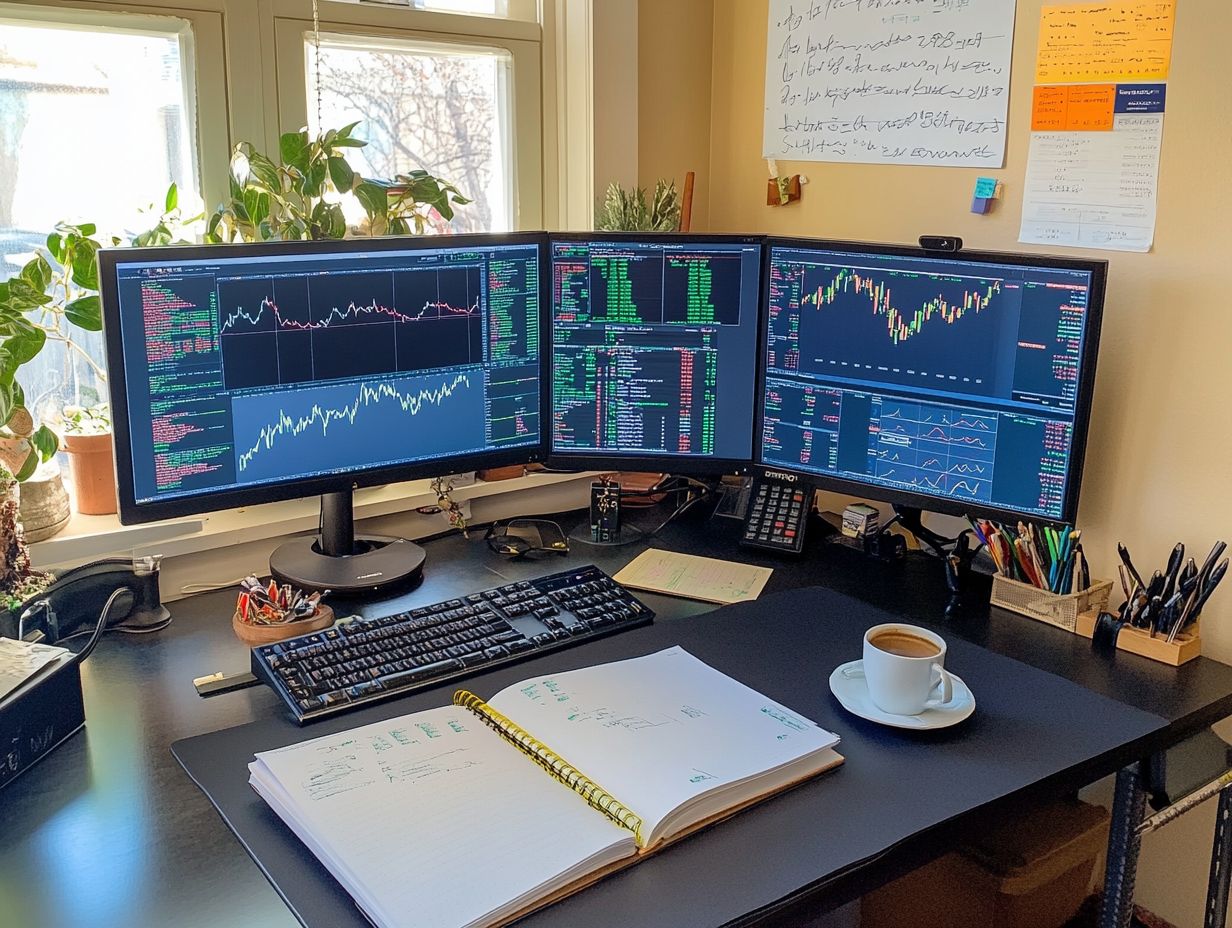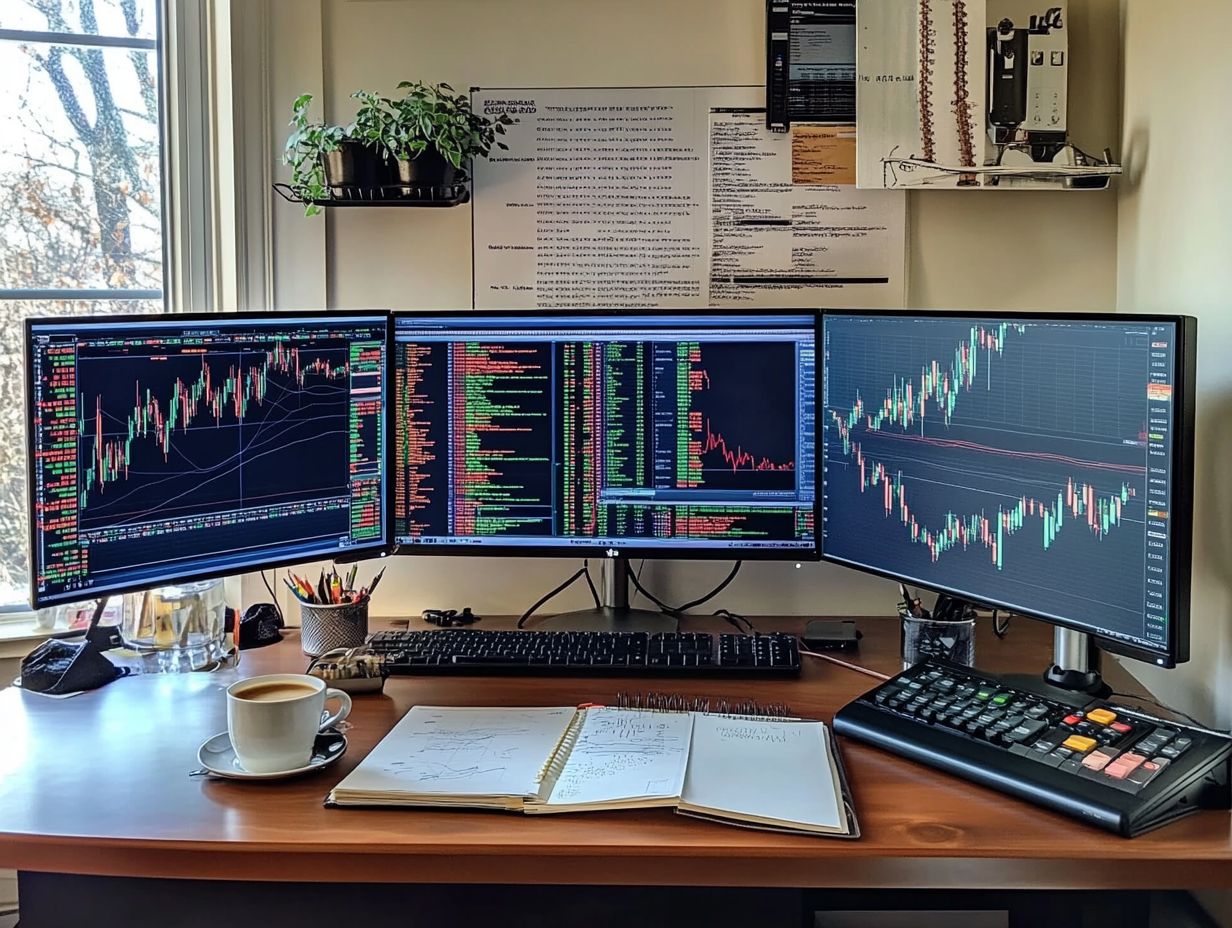The Importance of Discipline in Trading
Discipline is a cornerstone of successful trading. It shapes every decision and influences outcomes at every turn.
This article delves into the essence of discipline within the trading landscape and underscores its critical importance for achieving sustainable success. You will discover practical strategies to cultivate discipline and the psychological challenges traders often encounter.
We address the essential elements that help maintain focus, especially during times of market volatility.
Recognizing the repercussions of a lack of discipline illuminates its crucial role in reducing risks and minimizing losses. Dive in to discover the powerful link between discipline and trading success!
Contents
- Key Takeaways:
- Understanding Discipline in Trading
- The Role of Discipline in Successful Trading
- Developing Discipline in Trading
- The Consequences of Lacking Discipline in Trading
- Maintaining Discipline in the Face of Market Volatility
- The Psychological Aspect of Discipline in Trading
- Frequently Asked Questions
- What is the importance of discipline in trading?
- How does discipline affect trading performance?
- Why is discipline often difficult to maintain in trading?
- What are some strategies for maintaining discipline in trading?
- Can lack of discipline lead to financial losses in trading?
- How can traders develop discipline in trading?
Key Takeaways:

- Discipline in trading is crucial for making informed decisions and achieving long-term success.
- Lack of discipline can lead to potential risks and losses, while developing discipline can increase profitability.
- Maintaining discipline through market fluctuations and managing emotions is essential for successful trading.
Understanding Discipline in Trading
Understanding discipline in trading is key to consistent success in the ever-changing landscape of financial markets. It acts as the backbone of a well-crafted trading plan, enabling you to navigate the complexities of the stock market with assurance.
Discipline involves the emotional stability needed to adhere to your predetermined trading rules, minimizing the risk of impulsive decisions that could result in losing trades. It shapes your trading behaviors, influences your performance, and ultimately determines your long-term profitability.
By recognizing the significance of trading discipline, you can refine your skills and strategies, leading to better outcomes across various market conditions.
Defining Discipline in the Context of Trading
Discipline in trading is your ability to stick to a well-defined framework of rules and strategies, promoting emotional stability and supporting rational decision-making.
This structured approach is essential for navigating the unpredictable nature of financial markets, as it fosters consistency in your performance and helps you mitigate the impact of impulsive reactions.
When you cultivate discipline, you ll find it easier to adhere to your pre-defined strategies, which may include risk management techniques, profit-taking protocols, and clear entry and exit points.
Behavioral finance sheds light on the psychological aspects of trading, suggesting that undisciplined actions like overtrading or revenge trading often arise from emotional turmoil or thinking errors. For example, if you struggle to cut losses, it might reflect a lack of discipline driven by fear or hope, which can lead to even greater losses instead of sticking to your carefully crafted trading plan.
The Role of Discipline in Successful Trading
Discipline is fundamental to successful trading; it serves as the cornerstone upon which profitable strategies are crafted and executed. Understanding the importance of reflection in trading can help reinforce this vital trait, preventing you from straying from your trading plan, which can elevate risks and open the door to potential losses.
Discipline helps you maintain emotional control, enabling you to make rational decisions even amid the chaos of volatile markets. It also cultivates effective risk management, allowing you to safeguard your capital while pursuing long-term profitability.
By seamlessly integrating discipline into your trading routine, you dramatically increase your likelihood of attaining trading success.
How Discipline Affects Trading Decisions and Outcomes
Discipline plays a pivotal role in shaping your trading decisions and outcomes. It allows you to maintain focus and make informed choices even amidst the chaos of market volatility.
By crafting and sticking to a well-defined trading plan, you can significantly reduce the emotional responses that often cloud your judgment. A disciplined trader adheres to their strategy whether the trades are profitable or not. This paves the way for consistent evaluation and necessary adjustments.
On the flip side, an undisciplined trader may act on impulse, chasing losses or prematurely exiting positions out of panic or greed. This emotional turbulence not only leads to poor decision-making but can also culminate in substantial financial losses.
Cultivating discipline is essential for achieving reliable performance and ensuring your long-term success in the trading arena.
Developing Discipline in Trading

Cultivating discipline in trading is crucial if you’re aiming to reach your trading goals and execute your plan with precision. It demands a structured approach that harmonizes strategic planning with emotional control, paving the way for consistent trading behaviors.
By diligently maintaining a trading journal, you can glean insights from past experiences and spot patterns. This gradually strengthens your discipline in trading strategies. This endeavor is grounded in behavioral finance, which studies how our emotions affect our financial decisions. Recognizing your psychological triggers can significantly enhance your decision-making and commitment to your trading plans.
Tips and Strategies for Building Discipline
Building discipline in trading requires you to implement strategic tips and techniques designed to enhance your emotional control and ensure adherence to established trading rules.
By honing in on specific objectives and clearly outlining your trading rules, you can create a structured approach to your decision-making process. Keeping a trading journal becomes instrumental for reflection, allowing you to track your progress and gain valuable insights into your behaviors over time.
Practicing emotional control is equally essential, as it equips you to sidestep impulsive decisions driven by fear or greed. Fostering accountability with peers or mentors can significantly enhance your consistency, reinforcing positive habits while illuminating areas that need improvement.
Ultimately, ongoing reflection serves as the bedrock for continuous growth, ensuring that each trading experience contributes to a more disciplined and successful approach.
The Consequences of Lacking Discipline in Trading
The consequences of lacking discipline in trading can be profoundly detrimental. They often lead to substantial trading mistakes, a surge in losing trades, and an adverse effect on your emotional stability. When you stray from your trading plans and rules, you open yourself up to unnecessary risks, particularly in volatile market conditions.
This absence of discipline can result in impulsive decisions, missed opportunities, and a noticeable decline in your overall trading performance. Ultimately, this jeopardizes your long-term profitability.
Potential Risks and Losses
Potential risks and losses in trading can spiral out of control due to a lack of discipline, trapping you in a cycle of losing trades and emotional upheaval.
When you let your emotions take the wheel, impulsive decisions can derail your carefully crafted strategies. For example, if you find yourself gripped by fear after a few setbacks, you might hastily exit a position, only to watch it rebound without you. Conversely, a string of victories might inflate your confidence, prompting you to take reckless risks and overlook critical warning signals in the market.
This emotional rollercoaster can fog your judgment, leading to poorly timed entries or exits and further deepening your financial challenges. Recognizing the importance of emotional control is critical for achieving long-term success in trading.
Maintaining Discipline in the Face of Market Volatility
Maintaining discipline amid market volatility is vital for any trader aspiring to successfully navigate the unpredictable waters of financial markets. During times of heightened volatility, emotions can easily take the reins, leading to impulsive decisions that stray from your established trading rules.
That’s why sticking to a clearly defined trading plan and utilizing reliable trading signals is essential for sustaining discipline during these fluctuations. This method helps you manage risks effectively and positions you to seize profitable trading opportunities as they arise.
Strategies for Staying Disciplined During Market Fluctuations

Strategies for maintaining discipline during market fluctuations are essential for achieving consistent trading outcomes and minimizing losses.
As a trader, you often encounter unpredictable market movements that can easily throw your rational decision-making off course. To navigate this challenge effectively, it s crucial to establish clear trading signals that keep you focused and provide direction amidst the chaos.
Emotional control is key in this journey. You should actively monitor your feelings and be aware of when your judgment may be clouded by stress or excitement. Implementing pre-defined stop-loss levels serves as another vital strategy, helping you safeguard against potential losses and ensuring that emotional reactions don t dictate your decision-making process.
When emotions begin to escalate, taking breaks allows you to regain your composure. This helps you reassess your strategies with clarity, ultimately fostering a more disciplined approach to trading.
The Psychological Aspect of Discipline in Trading
The psychological aspect of discipline in trading is pivotal in shaping your trading behavior and decision-making processes. Recognizing the intricacies of your emotions and mindset can lead to improved emotional stability and a stronger commitment to your trading rules.
By incorporating principles from behavioral finance, you can gain valuable insights into your thinking errors those pesky hurdles that often obstruct disciplined trading. Acknowledging these psychological factors enables you to craft strategies that align seamlessly with your trading objectives, ultimately elevating your overall trading performance.
Mastering Your Emotions for Trading Success
Managing your emotions is essential for maintaining discipline in trading. Your emotional control directly influences your performance.
You can adopt various strategies to enhance your emotional awareness. This is crucial for steering clear of impulsive decisions that could lead to significant losses. Mindfulness techniques enable you to stay present and focused, allowing you to recognize emotional triggers before they escalate.
Practicing methods like deep breathing or meditation cultivates a clearer mindset, especially in high-pressure situations. Keeping a trading journal can significantly enhance your self-reflection, helping you identify patterns in your emotional responses during trades.
This approach not only nurtures discipline but also aids in better decision-making, ultimately paving the way for improved trading outcomes.
Frequently Asked Questions
What is the importance of discipline in trading?
Discipline is your secret weapon in trading success! It keeps you on track, helps manage risks, and prevents emotional pitfalls.
How does discipline affect trading performance?

Discipline greatly impacts trading performance as it allows you to maintain consistency in your actions and decisions, leading to better results over time.
Why is discipline often difficult to maintain in trading?
Discipline can be difficult to maintain due to the unpredictable nature of markets and the constant temptation to deviate from your trading plan.
Summary: Maintaining discipline in trading is crucial for navigating market volatility, making rational decisions, and ultimately succeeding in your trading endeavors. By mastering your emotions and sticking to your trading plan, you can enhance your performance and achieve your trading goals. Take these strategies to heart and put them into practice!
What are some strategies for maintaining discipline in trading?
To maintain discipline in trading, create a detailed trading plan. Set clear risk management rules, and practice self-control to manage your emotions.
Can lack of discipline lead to financial losses in trading?
Yes, a lack of discipline can cause significant financial losses. It often leads to impulsive decisions that harm your trading account.
How can traders develop discipline in trading?
Developing discipline takes consistent effort. Review your trading plan regularly, stay focused, and learn from your mistakes.





